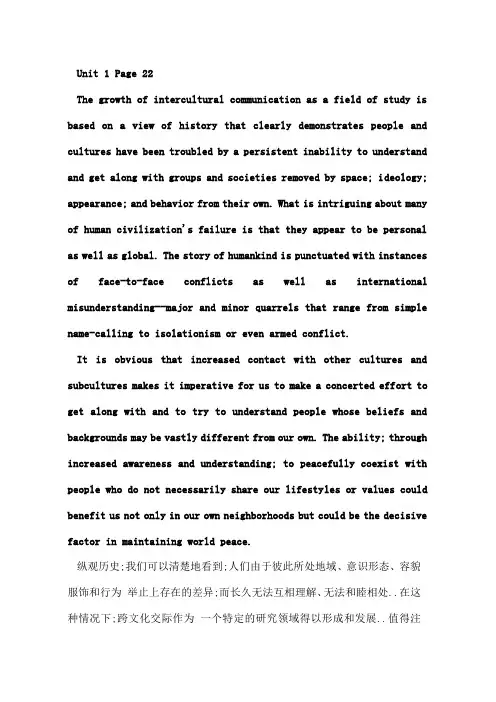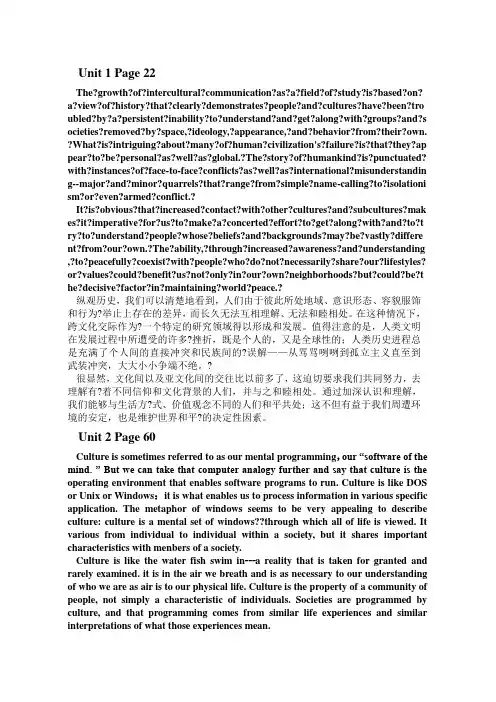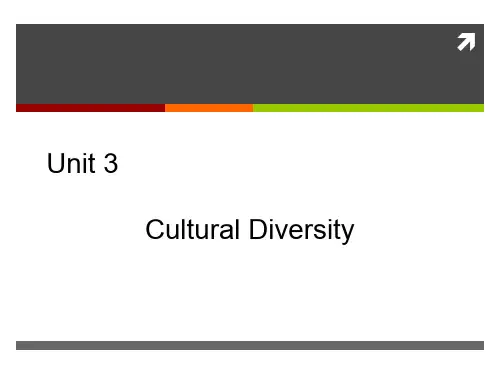翻译与跨文化交际 第三章
- 格式:ppt
- 大小:707.00 KB
- 文档页数:8

第一单元现代社会依赖于技术创新,而技术创新须依靠知识产权来保障。
越来越多的国家遵守国际条约,实行知识产权保护。
但这方面做得还远远不够。
我们来回顾一下过去,看看缺乏知识产权保护会导致什么样的后果,从而吸取教训。
许多西方公司付出了惨痛的代价才发现,知识产权保障机制还未健全时,在东南亚投资无异于将钱付诸东流。
要进入这些市场,西方公司不仅必须向相关当局说明他们的产品,而且还要说明他们产品的制作过程。
而结果经常是本该受到知识产权保护的产品很快被无耻地抄袭。
盗用知识产权的例子不胜枚举。
例如,美国化学制品巨头杜邦向一亚洲国家引进了一种名叫Londax的著名除草剂,用来除掉稻田里的杂草。
该公司在该产品的研发上投资了数百万美元,而且又投入了2500万美元在当地开设了一家生产厂家。
然而,不到一年以后,一瓶瓶非常廉价的冒牌Londax公然上市了。
冒牌产品和正宗产品除了价格外的唯一区别是冒牌产品的名称是Rondex,用的是蓝色瓶而不是正宗产品用的绿色瓶。
但是,由于冒牌产品的价格比正宗产品的价格低廉许多,它成功毁掉了杜邦公司的投资。
同时它也使得该公司不再愿意投资于新化学制品的研发。
生产Londax的配方本应该被当作是杜邦公司的知识产权。
其他非法使用该配方的公司是犯了偷盗行为,就像盗取了杜邦公司的机器或者该公司的其他财产一样。
不光是产品,在亚洲市场上保护一个品牌也曾经是几乎不可能的事。
就连Kellogg’s玉米片的生产商Kel logg’s公司也发现自己的产品被山寨:Kongal 牌玉米条,连包装也几乎一模一样。
不幸的是,和杜邦公司的事件一样,Kellogg’s 公司成功惩罚侵权者的几率几乎为零,因为当地的法律不承认知识产权保护的概念。
幸好,在经过许多轮世贸组织的谈判后,情况大为改观。
然而,跨国公司必须保持警惕,以防被侵权。
总有人试图从别人的研发、投资、商誉中牟利。
如果成果得不到法律保护,创新就是空话。
如今你经常会听到“知识产权”这个词——通常是从产权者嘴里。

Unit 1 Page 22The growth of intercultural communication as a field of study is based on a view of history that clearly demonstrates people and cultures have been troubled by a persistent inability to understand and get along with groups and societies removed by space; ideology; appearance; and behavior from their own. What is intriguing about many of human civilization's failure is that they appear to be personal as well as global. The story of humankind is punctuated with instances of face-to-face conflicts as well as international misunderstanding--major and minor quarrels that range from simple name-calling to isolationism or even armed conflict.It is obvious that increased contact with other cultures and subcultures makes it imperative for us to make a concerted effort to get along with and to try to understand people whose beliefs and backgrounds may be vastly different from our own. The ability; through increased awareness and understanding; to peacefully coexist with people who do not necessarily share our lifestyles or values could benefit us not only in our own neighborhoods but could be the decisive factor in maintaining world peace.纵观历史;我们可以清楚地看到;人们由于彼此所处地域、意识形态、容貌服饰和行为举止上存在的差异;而长久无法互相理解、无法和睦相处..在这种情况下;跨文化交际作为一个特定的研究领域得以形成和发展..值得注意的是;人类文明在发展过程中所遭受的许多挫折;既是个人的;又是全球性的;人类历史进程总是充满了个人间的直接冲突和民族间的误解——从骂骂咧咧到孤立主义直至到武装冲突;大大小小争端不绝..很显然;文化间以及亚文化间的交往比以前多了;这迫切要求我们共同努力;去理解有着不同信仰和文化背景的人们;并与之和睦相处..通过加深认识和理解;我们能够与生活方式、价值观念不同的人们和平共处;这不但有益于我们周遭环境的安定;也是维护世界和平的决定性因素..Unit 2 Page 60Culture is sometimes referred to as our mental programming;our “software of the mind. ” But we can take that computer analogy further and say that culture is the operating environment that enables software programs to run. Culture is like DOS or Unix or Windows:it is what enables us to process information in various specific application. The metaphor of windows seems to be very appealing to describe culture: culture is a mental set of windows through which all of life is viewed. It various from individual to individual within a society; but it shares important characteristics with menbers of a society.Culture is like the water fish swim in┄a reality that is taken for granted and rarely examined. it is in the air we breath and is as necessary to our understanding of who we are as air is to our physical life. Culture is the property of a community of people; not simplya characteristic of individuals. Societies are programmed by culture; and that programming comes from similar life experiences and similar interpretations of what those experiences mean.If culture is mental programming; it is also a mental map of reality. It tells us from early childhood what matters; what to prefer; what to avoid; and what to do. Culture also tells us what ought to be. It gives us assumptions about the ideal beyond what individuals may experience. It helps us in sitting priorities. It establishes codes for behavior and provides justification and legitimization for that behavior.文化有时候被称为我们的心智程序;我们“头脑的软件”..但是;我们可以进一步引申这个用电脑所做的类比;把文化看作是支持运行的操作环境..文化就像电脑使用的 DOS 或者 Unix 或者“视窗”Windows等操作系统一样;使我们能在各种各样的实际应用中处理信息.. 用“视窗”这个比喻来描述文化似乎也很有吸引力..文化就是我们心灵的视窗;透过它我们审视生活的方方面面..一个社会中不同个体的视窗是不大一样的;但都有着一些重要的共同特征..文化就好像是鱼畅游于其中的水一般;人们想当然地把文化看成是客观存在的事实;因而很少去研究它..文化存在于我们所呼吸的空气之中;文化对于我们了解我们自身之为何物是必不可少的;就正如生命离不开空气一样..文化是特定群体的共有财产;而不单是个体的特征..社会按照文化设定的程序运作;这种程序来自于相似的生活体验以及对这种生活体验之含义的相似阐释..如果文化是一种心智程序;那么它也是现实的心灵地图..从我们很小的时候开始;文化就告诉我们应该看重什么、偏好什么、规避什么和做些什么;文化还告诉我们事物应该是什么样..文化为我们提供超越个体经验可能的理想典范;帮助我们决定应该优先考虑的人或事.. 文化为我们建立起行为准则;并视遵守这些准则的行为为正当、合法..Unit 3 Page 96Although each of us has a unique set of values; there also are values that tend to permeate a culture. These are called cultural values.Cultural values generally are normative in that they inform a member of a culture what is good and bad; right and wrong; true and false;positive and negative; and the like. Culture values define what is worthwhile to die for; what is worth protecting; what frightens people and their social systems; what are considered proper subjects for study and for ridicule; and what types of events lead individuals to group solidarity. Culture values also specify what behaviors are of importance and which should be avoided within a culture. Values represent a learned organization of rules for making choices and for resolving conflicts.The values held by participants in intercultural communication are important because values develop standards and guidelines that establish appropriate and inappropriate behaviors in a society.Values; in other words; help determine how people ought to behave with the result that people will exhibit and expect behaviorsaccording to their value systems. To the extent that culture value systems differ; we may expect that intercultural communication participants will tend to exhibit and to expect different behaviors under similar circumstances.虽然;我们每个人都有各自一套独特的价值观;但在每一文化里;总有弥漫于整个文化之中的普遍的价值观..这些被称作文化价值观文化价值观通常是规范性的;它使文化的成员知道什么是好的和坏的、什么是正确的和错误的、什么是真的和假的、什么是积极的和消极的;等等..文化价值规定了什么是值得为之献身的;什么是值得维护的;什么会危及人们及其社会制度;什么是学习的恰当内容;什么是可讽刺嘲笑的;什么是形成群体团结的途径..文化价值观也指明了文化中的什么行为是举足轻重的;哪些是应当尽力避免的..价值观是人们在做出抉择和解决争端时作为依据的一种习得的规则体系..跨文化交际的参与者所具有的价值观是十分重要的;因为价值观产生出决定何为正当或不正当社会行为的标准..换言之;价值观有助于人们决定他们的行为方式;以符合他们的价值系统所期望的行为准则..由于文化价值系统之间存在差异;我们可以预见;在相似的情境中;跨文化交际的参与者会表现出并期待着不同的行为..Unit 4 Page 141When we say that language is always ambiguous; what we mean is that we can never fully control the meanings of the things we say and write. The meanings we exchange by speaking and by writing are notgiven in the words and sentences alone but are also constructed partly out of what our listeners and our readers interpret them to mean. To put this quite another way; meaning in language is jointly constructed by the participants in communication.Language is inherently ambiguous. It means that in order to communicate we must always jump to conclusions about what other people mean. There is no way around this.When someone says something; we must jump to some conclusion about what he or she means. We draw inferences based on two main sources: 1 the language they have used; and 2 our knowledge about the world. The knowledge includes expectations about what people would normally say in such circumstances.Language is ambiguous. This means that we can never be certain what the other person means------whether in speaking or writing. To put it another way; language can never fully express our meanings. But what does this mean for intercultural communicationIn the first place it should be clear that communication works better the more the participants share assumptions and knowledge about the world. Where two people have very similar histories; backgrounds; and experiences; their communication works fairly easily because the inferences each makes about what the other means will be based on common experience and knowledge. Two people fromthe same village and the same family are likely to make fewer mistakes in drawing inferences about what the other means than two people from different cities on different sides of the earth.我们说语言总是模糊的;指的是我们所说所写的东西总不能完全表达我们的意图..我们通过说话和写作所传达的意思不仅仅由词语和句子本身决定;听众和读者的理解也起到了一定的作用..换言之;是交际双方共同创造了语言所表达的意思..语言的模糊性是与生俱来的..为了沟通;我们必须自己推断出对方的意思;除此之外别无他法..在理解别人说话时;我们必须推测这些话的意思..这些推测主要基于以下两个来源: 1他们所使用的语言;2我们的世界知识..这种知识包括能够预知在某种特定语境下人们通常会说些什么..语言是模糊的..这意味着无论是读或写;我们永远无法完全地领会他人的意思..换言之; 语言永远无法完全地表达我们的意思..然而;这对跨文化交际意味着什么呢首先必须明白;如果交际参与者拥有更多共同的预期和世界知识;交际便会有比较好的效果..共同的背景、历史和经历使得人们之间的交际较为容易;因为任何一方对另一方用意的推测都基于共同的经验和知识..来自同一个村子、同一个家庭的两个人当然要比来自地球不同半球不同城市的两个人少犯交际上的错误;至少不会在推测对方用意上闹笑话..Unit 5 Page 175Where any two people differ in group membership because they are of different genders; different age; different ethnic and differentcultural groups; different educations; different parts of the same country or even city; different income or occupational groups; or with very different personal histories; each will find it mire difficult to draw inferences about what the other person means.In the contemporary world of international and intercultural communication; the differences between people are considerable. People are in daily contact with members of cultures and other groups from all around the world. Successful communication is based on sharing as much as possible the assumptions we make about what other mean; when we are communicating about what they mean; and so it is impossible to depend on shared knowledge and background for confidence in our interpretations.It has been found that men and women from the same culture; even from the same families; often misunderstand each other because of different assumptions they make about the purposes or goals they communication.A man may wish to make a woman happy by giving her a gift of something she really wants. He asked her what her would like to have for her birthday-she can ask foe anything. Unfortunately; what she wants more than anything else is for him to know intuitively what she would like to have. Men and women; at least in North American society; tend to differ in their concern for explicitness or for indirection. A woman is likely to think it is important for someone to show how well heknows her by not having to ask explicitly what she wants. A man in that situation; however; feels best about the situation if he is told quite directly and explicitly how he can make her happy.由于在性别、年龄、种族或文化群体、教育、国家或城市的地域、收入或职业群体、个人经历等各方面的差异;人们分属不同的语言群体;这些差异使我们很难完全领会另一个群体成员所表达的意思..在当今世界的跨文化交际中;人们之间的差异是相当大的..人们每天要与来自世界各地不同文化背景、不同群体的人交往;成功交际的关键在于尽可能地共享对话语意义的推定.. 当我们与迥然不同的人打交道时;我们往往不知道该怎样推导出他们的语句意义..因此;在交际过程中;就很难依靠共享的知识和背景来有把握地诠释他人表达的意义..就是来自相同文化、甚至相同家庭中的男性和女性也会经常误解对方的意思;原因是男性和女性对交际目的有不同的预期..为了让女人高兴;男人要送她一件她真正想要的礼物.. 他问女人想要什么礼物——哪怕是上天摘星星..糟糕的是;女人最想要的却是男人可以凭直觉就知道她想要的是什么..至少在北美社会中;男性和女性对于表达的看法往往不同:前者倾向于直接明了;后者则倾向于间接委婉..女性觉得不用直接问就知道她想要什么是很重要的..男性则觉得;如果女性能爽快地告诉他怎样做才能让她高兴就再好不过了..Unit 6 Page 215Non-verbal communication might be thought of as any form of communication which is not directly dependent on the use of language.Generally speaking; h owever; it’s a little difficult to know where to separate verbal and non-verbal forms of communication. Such non-verbal aspects of communications as nodding the head most often accompany speech and are part and parcel of the verbal system of language use. On the other hand such forms of communication as dance and music often have no verbal component at all. What we want to do here is simply to call attention to the fact that many aspects of human interaction depend upon forms of communication which cannot be easily transcribed into words and yet are crucial to our understanding of each other.Of course we have to emphasize the importance of communication also takes place without the writing; and yet we should also realize that much communication also takes place without the use of words. The way a person dressed for a meeting may suggest to other participants how he or she is prepared to participate in it. In fact; we can use virtually any aspect of our behavior or our presentation which others can perceive as a means of communication.非言语交际被认为是不直接依靠语言使用的任何交际方式..然而;一般来说;很难知道言语交际方式与非言语交际方式的区分到底在哪儿..有些非言语交际方式;例如点头;总是伴随着言语;而且是语言使用时言语系统的一部分..另一方面;像舞蹈和音乐等交际形式常常是没有任何言语成分的..我们在这里想做的只是要引起大家对一个事实的注意;即人类交往的许多方面都依赖于那些不能轻易转换为言语、但却对我们相互理解至关重要的交际形式..当然; 我们不能不强调口语和书面语交际的重要性;然而我们也必须意识到许多交际的发生并不使用语言..一个人出席会议时的穿着会可能是暗示其他与会者;他或她打算如何参与会议..事实上;我们能运用我们行为或表现的任何方面来和他人进行交际..。

Unit 1 Page 22The?growth?of?intercultural?communication?as?a?field?of?study?is?based?on? a?view?of?history?that?clearly?demonstrates?people?and?cultures?have?been?tro ubled?by?a?persistent?inability?to?understand?and?get?along?with?groups?and?s ocieties?removed?by?space,?ideology,?appearance,?and?behavior?from?their?own. ?What?is?intriguing?about?many?of?human?civilization's?failure?is?that?they?ap pear?to?be?personal?as?well?as?global.?The?story?of?humankind?is?punctuated? with?instances?of?face-to-face?conflicts?as?well?as?international?misunderstandin g--major?and?minor?quarrels?that?range?from?simple?name-calling?to?isolationi sm?or?even?armed?conflict.?It?is?obvious?that?increased?contact?with?other?cultures?and?subcultures?mak es?it?imperative?for?us?to?make?a?concerted?effort?to?get?along?with?and?to?t ry?to?understand?people?whose?beliefs?and?backgrounds?may?be?vastly?differe nt?from?our?own.?The?ability,?through?increased?awareness?and?understanding ,?to?peacefully?coexist?with?people?who?do?not?necessarily?share?our?lifestyles? or?values?could?benefit?us?not?only?in?our?own?neighborhoods?but?could?be?t he?decisive?factor?in?maintaining?world?peace.?纵观历史,我们可以清楚地看到,人们由于彼此所处地域、意识形态、容貌服饰和行为?举止上存在的差异,而长久无法互相理解、无法和睦相处。

跨越语言与文化的学科指南翻译与跨文化交际学跨越语言与文化的学科指南:翻译与跨文化交际学引言在全球化的今天,语言和文化之间的交流与融合变得愈加重要。
翻译与跨文化交际学作为一门学科,旨在帮助人们跨越语言与文化的障碍,促进文化交流和理解。
本文将介绍翻译与跨文化交际学的基本概念、重要性以及相关的学习指南。
一、翻译的定义与分类翻译是将一种语言的文字或口头表达转化为另一种语言的过程。
根据不同的研究对象和研究方法,翻译可以分为文学翻译、口译翻译、科技翻译等多个领域。
在翻译过程中,准确传达原文的意义与风格是核心目标之一。
二、跨文化交际学的概念与重要性跨文化交际学是研究跨越不同文化背景下的交际行为,并通过理论与实践来帮助人们实现更有效的跨文化交流。
它关注跨文化差异的存在和影响,并强调跨文化交际中的文化自觉和文化适应能力。
在全球化背景下,跨文化交际能力成为人们必备的核心竞争力。
三、翻译与跨文化交际学的关联翻译与跨文化交际学紧密相关。
通过翻译,人们可以消除语言障碍,进行跨文化交际。
而在翻译过程中,跨文化交际学的理论和方法可以帮助翻译者更好地理解原文的文化内涵,准确传达信息。
因此,翻译与跨文化交际学互相促进,相互依赖。
四、学习翻译与跨文化交际学的指南1. 掌握语言技能作为翻译与跨文化交际学的基础,语言技能是必不可少的。
学习者应该加强对源语言和目标语言的听、说、读、写能力的训练,熟练掌握语法、词汇及语言表达。
2. 深入了解文化背景了解不同文化的价值观、习俗、礼仪等是跨文化交际学的重要内容。
学习者应该通过阅读、观察和实践,扩展自己的跨文化知识,并理解文化背景对翻译和交际的影响。
3. 学习翻译技巧与方法翻译技巧与方法的学习是翻译与跨文化交际学的核心内容。
学习者应该了解不同领域的翻译要求,掌握专业词汇和表达方式,培养准确理解原文的能力,并学会使用不同的翻译技巧和策略。
4. 提高跨文化交际能力跨文化交际能力的提高需要不断的实践与反思。

跨⽂化交际第三章课件Unit 3Daily Communication (II)Case AnalysisCompliments and Compliment Responses Gift-giving and gift-receiving ExercisesCase AnalysisAn Invitation to DinnerThe Cancellation of the Dinner Party Why should they do like this The Embarrassment Caused by “No Etiquette”Compliments and Compliment ResponsesMain point: Chinese modestySocial functions of compliments Differences between Chinese compliments and English complimentsCultural assumptionExpressions for gratitude in English and ChineseCommon expressions for apology inChinese ModestyOh, it’s an ordinary dress I bought in China.Should I blush, or should I tell him you don’t really mean it Growing flowers is my hobby, but I’m not much good at it.I really know so little about the subject....Social functions of complimentsCreating or reinforcing solidarity greeting peopleexpressing thankscongratulationencouraging peoplesoftening criticismstarting a conversationgetting over embarrassmentDifferences between Chinese compliments and English complimentsThe Semantic formulaThe Syntactic FormulaCommon responses formula in E-and C-complimentsThe Semantic FormulaEnglish:This was a great meal.Bill, you look so nice today.I love your dresses.About 80% adj. 16%verbs Chinese:你的房间不错。


关于跨文化交流,跨文化市场才是第一的真正的首要的范本。
考虑到古罗马帝国的市民,他们是第一个诞生商店的地球文明。
商人们通过在商店的上面树立旗帜来展示他们商品货物的图片来解决跨文化市场的困扰。
这种做法不仅能为罗马帝国中未受过教育的市民服务还能帮助罗马商人们获得被他们用武力征服的殖民地的商业信息。
回顾过去,我们会发现两千多年前的亚里士多德曾明确说过:“有效劝服基本的信念仍可以把他应用到今天的买卖商品上然而在古代的雅典可能会引起一场大的争论”。
很明显的可以看出,交流是现代市场的根基。
毋庸置疑,全球化市场的时代已经到来。
每年超过4万件的商品货物进入国际市场,其中超过一半是来自美国。
这里面85%的商品都不合格。
通往国际化市场成功的道路是建立在失败的市场垃圾碎片和广泛的广告活动之上的。
他们中的大多数之所以会失败,是因为跨文化交流被曲解了。
在跨文化市场里,如果你想把低劣的语言举止降低到最小,那么就不假定任何事情。
几乎我们都听说过关于美国通用汽车公司,他们尽力想把他们的雪佛兰牌汽车销往拉美国家。
但是雪佛兰在说西班牙语的拉美国家按字面意思是不能行走。
当公司发现汽车买不出去的原因时,他们就把车重新命名,然后销往这些国家。
福特汽车公司,美国又一个汽车界的领头羊,也有类似的问题。
他们的pinto 牌汽车在当地也没有达到预期的销售,原因时他们的汽车其意思在当地为男性生殖器。
最终福特公司把所有的名牌汽车重新命名为corcel,其意思为骏马。
伊莱克斯,一个日用电器制造者,其在英国获得了很大的成功。
不幸的是,他们的广告招牌的意思在美国和英国大不相同。
在美国,suck的意思是多虱子的。
英国的牙膏生产商在法国制造出来了一种牙膏叫cue。
它被人们所耻笑。
因为它的名字使人想起了臭名昭著的色情杂志——Cue。
但是市场中的文化意识更多于细心的翻译。
每一文化都有其微妙之处,当然也有其鲜明的禁忌。
尽管大多数的人不能列出他们自己文化的规则,但是他们很明白什么时候这些禁忌被触碰了。

1.纵观历史,我们可以清楚地看到,各民族与文化由于彼此所处地域、意识形态、容貌服饰和行为举止上存在的差异,而长久无法互相理解,无法和睦相处。
在这种情况下,跨文化交际作为一个特定的研究领域得以形成和发展。
值得注意的是,人类文明在发展过程中所遭受的许多挫折,既是个人的,又是全球性的;人类历史进程总是充满了个人间的直接冲突和民族间的误解--从骂骂咧咧到孤立主义甚至到武装冲突,大大小小争端不绝。
很显然,文化间以及亚文化间的交往日益增多,这迫切要求我们共同努力,去理解与我们有着天壤之别信仰和文化背景的人们,并与之和睦相处。
通过加深认识和理解,我们能够与生活方式、价值观念不同的人们和平共处;这不但有益于我们周遭环境的安定,也是维护世界和平的决定性因素。
2.文化有时候被称为我们的心智程序,也即我们“头脑的软件”。
但是,我们可以进一步引申这个用电脑所做的类比,把文化看作是支持软件运行的操作环境。
文化就像电脑使用的DOS或者Unix或者“视窗”(Windows)等操作系统一样,使我们能在各种各样的实际应用中处理信息。
用“视窗”这个比喻来描述文化似乎也很有吸引力。
文化就是我们心灵的视窗,透过它我们可以审视生活的方方面面。
一个社会中不同个体的视窗是大不一样的,但都有着一些重要的共同特征。
文化就好像是鱼畅游于其中的水一般,人们想当然地把文化看成是客观存在的事实,从而很少去研究它。
文化存在于我们所呼吸的空气之中,文化对我们了解自我是必不可少的,就正如生命离不开空气一样。
文化是特定群体的共有财产,而不单是个体的特征。
社会按照文化设定的程序来运作,这种程序来自于相似的生活体验以及对这种生活体验之涵义的相似性阐释。
如果文化是一种心智程序,那么它也是现实的心灵地图。
从我们很小的时候开始,文化就告诉我们应该看重什么、偏好什么、规避什么以及做些什么。
文化还告诉我们事物应该是什么样的。
文化为我们提供超越个体经验的理想典范,帮助我们决定应该优先考虑什么。

Unit 2 Page 60 Unit 3 Page 96Unit 5 Page 175 Unit 6 Page 215Case 2A common cultural misunderstanding in classes involves conflicts between what is said to be direct communication style and indirect communication style. In American culture, people tend to say what is on their minds and to mean what they say. Therefore, students in class are expected to ask questions when they need clarification. Mexican culture shares this preference of style with American culture in some situations, and that‘s why the students from Mexico readily adopted the techniques of asking questions in class. However, Korean people generally prefer indirect communication style, and therefore they tend to not say what is on their minds and to rely more on implications and inference, so as to be polite and respectful and avoid losing face through any improper verbal behavior. As is mentioned in the case, to many Koreans, numerous questions would show a disrespect for the teacher, and would also reflect that the student has not studied hard enough.Case 3The conflict here is a difference in cultural values and beliefs. In the beginning, Mary didn’t realize that her Dominican sister saw her as a member of the family, literally. In the Dominican view, family possessions are shared by everyone of the family. Luz was acting as most Dominican sisters would do in borrowing without asking every time. Once Mary understood that there was a different way of looking at this, she would become more accepting. However, she might still experience the same frustration when this happened again. She had to find ways to cope with her own emotional cultural reaction as well as her practical problem (the batteries running out).Case 6When a speaker says something to a hearer, there are at least three kinds ofmeanings involved: utterance meaning, speaker’s meaning and hearer’s meaning. In the dialogue, when Litz said ‘How long is she going to stay?’ she meant to say that if she knew how long her mother-in-law was going to stay in Finland, she would be able to make proper arrangements for her, such as taking her out to do some sightseeing. However, her mother-in-law overheard the conversation, and took Litz’s question to mean “Litz does not want me to stay for long”. From the Chinese point of view, it seems to be inappropriate for Litz to ask such a question just two days after her mother-in-law’s arrival. If she feels she has to ask the question, it would be better to ask some time later and she should not let her mother-in-law hear it.Case 7Keiko insists on giving valuable gifts to her college friends, because in countries like Japan, exchanging gifts is a strongly rooted social tradition. Should you receive a gift, and don’t have one to offer in return, you will probably create a crisis. If not as serious as a crisis, one who doesn’t offer a gift in return may be considered rude or impolite. Therefore, in Japan, gifts are a symbolic way to show appreciation, respect, gratitude and further relationship.Keiko obviously has taken those used items from Mary, Ed and Marion as gifts, for she probably doesn’t know that Americans frequently donate their used household items to church or to the community. Mary, Ed and Marion would never consider those used household items given to Keiko as gifts. No wonder they felt very uncomfortable when they received valuable gifts in return.Case 10In Japan, a company is often very much like a big family, in which the manger(s) will take good care of the employees and the employees are expected to devote themselves to the development of the company and, if it is necessary, to sacrifice their own individual interests for the interests of the company, from which, in the long run, the employees will benefit greatly. But for the French, a company is just a loosely- knit social organization wherein individuals are supposed to take care of themselves and their families. Moreover, the way the French make decisions in the family might also be different from the typical Japanese one, which may not often involve females and the power to decide usually lies with the dominating male. As there are such cultural differences between the Japanese and the French, Mr. Legrand’s decision made Mr. Tanaka feel dumbfounded.Case 12In this case, it seems that the Chinese expectations were not fulfilled. First, having two people sharing host responsibilities could be somewhat confusing to the hierarchically minded Chinese. Second, because age is often viewed as an indication of seniority, the Chinese might have considered the youth of their Canadian hosts as slight to their own status. Third, in China, it is traditional for the host to offer a welcome toast at the beginning of the meal, which is the reciprocated by the guests; by not doing so, the Canadian might be thought rude. The abrupt departure of the Chinese following the banquet was probably an indication that they were not pleased with the way they were treated. The Canadians’ lack of understanding of the Chinese culture and the Chinese ways of communication clearly cost them in their business dealings with the visiting delegation.Case 17When these two men separate, they may leave each other with very different impressions.Mr Richardson is very pleased to have made the acquaintance of Mr Chu and feels they have gotten off to a very good start. They have established their relationship on a first-name basis and Mr Chu’s smile seemed to indicate that he will be friendly and easy to do business with. Mr Richardson is particularly pleased that he had treated Mr Chu with respect for his Chinese background by calling him Hon-fai rather than using the western name, David, which seemed to him an unnecessary imposition of western culture.In contrast, Mr Chu feels quite uncomfortable with Mr Richardson. He feels it will be difficult to work with him, and that Mr Richardson might be rather insensitive to cultural differences. He is particularly bothered that, instead of calling him David or Mr Chu, Mr Richardson used his given name, Hon-fai, the name rarely used by anyone, in fact. It was this embarrassment which caused him to smile. He would feel more comfortable if they called each other Mr Chu and Mr Richardson. Nevertheless, when he was away at school in North America he learned that Americans feel uncomfortable calling people Mr for any extended period of time. His solution was to adopt a western name. He chose David for use in such situations.Case 19Talking about what’s wrong is not easy for people in any culture, but people in high-context countries like China put high priority on keeping harmony, preventing anyone from losing face, and nurturing the relationship. It seems that Ron Kelly had to learn a different way of sending message when he was in China. At home in Canada he would have gone directly to the point. But in China, going directly to the problem with someone may suggest that he or she has failed to live up to his or her responsibility and the honor of his or her organization is in question. In high-context cultures like China, such a message is serious and damaging. In low-context cultures, however, the tendency is just to “spit it out”, to get it into words and worry about the result later. Senders of unwelcome messages use objective facts, assuming, as with persuasion, that facts are neutral, instrumental, and impersonal. Indirectness is often the way members of high-context cultures choose to communicate about a problem. Case 21Sometimes our best intentions can lead to breakdowns (故障)in cross-cultural communication. For example, one of the very common manners of touching --- handshaking --- may result in conflict when performed with no consideration of cultural differences. Among middle-class North American men, it is customary to shake hands as a gesture of friendship. When wanting to communicate extra friendliness, a male in the United States may, while shaking hands, grasp with his left hand his friend’s right arm. However, to people of Middle Eastern countries, the left hand is profane (亵渎的) and touching someone with it is highly offensive. Therefore, in Vernon’s eyes, Kenneth was actually an extremely offensive message to him. Case 22In Puerto Rican culture, as in some other Latin American and Eastern cultures, it is not right for a child to keep an eye-contact with an adult who is accusing him or her, while in the United States, failing of meeting other person’s eye accusing him or her would be taken as a sign of guiltiness. As the principal knew little about this cultural difference in using eye-contact, he decided that the girl must be guilty. Generallyspeaking, avoiding eye-contact with the other(s) is often considered as an insult in some cultures, but may signify respect for authority and obedience in other cultures. Case 25For people from the American culture and western European cultures, one’s time should be scheduled into segments or compartments which are to be kept discrete from one another. They prefer to do one thing at a time. They will be annoyed when they have made an appointment with somebody, only to find a lot of other things going on at the same time. They don’t like to interrupt others and be interrupted by other while they are doing something. In contrast, people from many other cultures including the Chinese culture are more likely to operate with several people, ideas, or matters simultaneously. They are more easily distracted and subject to interruptions, which they would not usually mind very much. The miscommunication between Katherine and the director can be ascribed to their lack of knowledge about each other’s way of using time.In this case, to the Chinese director as well as many other Chinese people, it is natural to handle the other things which needed to be dealt with immediately. He may have thought that, in this way, he utilized the time best. But to Katherine and most Westerners, it’s quite different. They tend to do things strictly according to their schedule and appointments with others, which is their concept of using time best.高语境交流和低语境交流(由高到低排列)Japanese, Chinese, Korean, African American, Native American, Arab, Greek, Latin,Italian,English,Frech,Amercian,Scandinavian,German,German-Swiss。


Reading & DigestingAre They Typical?Cathy N. Davidson1 Unlike my American students, students at Kansai Women’s University rarelyattended my office hours. Ten one day a local newspaper reporter interviewed me for a column about gaijins’ impression of the typical Japanese woman.2 Before moving to Japan, I could answer without hesitation. I had the samepreconceptions that most Westerners have about Japanese women— submissive, flirtatious and accommodating. After teaching in Japan for several months, I was unable to characterize the Japanese women I’d met. I was impressed, in general, by their strength and independence, but I didn’t know how to describe “the typical Japanese woman.”3 “Is there one?” I finally asked helplessly.4 I told the reporter that I now knew what was not typical (I’d seen only twogeisha), but I had no clue what a typical Japanese woman was.5 “I guess I’ll have to spend the rest of my year trying to find her!” I joked.6 I don’t know how this joke translated but according to the article, I wasdescribed as a “feminist”who had come to Japan partly to learn more about Japanese women. Suddenly students began showing up during my office hours, as if my words in the newspaper were an invitation for them to come to discuss personal matters with me or ask my advice without compromising their own lives.Apparently, I had said publicly that I was interested in learning more about Japanese women so students came to share their opinions.7 “I am the typical Japanese woman,” my neighbor, Mrs. Okano, insists a fewmornings after reading the newspaper.8 “I’m serious,”my neighbor says, “if you want to know anything abouttypical Japanese women, you can ask me.”9 “Why do you consider yourself ‘typical’?” I ask her.10 “Because I am,” she laughs. “There’s nothing unusual about me at all!”11 “I think it’s unusual,” I say admiringly, “for somebody to admit they’retypical. Most people think they are pretty special.”12 “Oh, maybe in America,” she laughs. “But in Japan, every womanthinks they’re typical.”13 As we laugh, the mailwoman approaches and Mrs. Okano excusesherself to meet her.14 She reminds the mailwoman that from now on her mail should bedelivered to her new address.15 “You’re moving today?” I ask, surprised at how disappointed I feel.16 “Gomennasai, gomennasai,” she apologizes, realizing that I wasunaware. Probably everyone else at Maison Showa has known for weeks.17 I tell her I’m sorry to hear that she is moving, but that I hope she willenjoy her new apartment.18 “It’s a house,” she says, unable to conceal her pride.19 She is expecting the movers soon but insists on inviting me to giveme a copy of a map she has neatly drawn, marking the way to her new house.20 “Now you can come and visit me,” she beams, handing it to me. “I also gavemy husband a map this morning so he can find it tonight after work.” She says this casually.21 “I don’t understand. You mean, he doesn’t remember the way?”22 “He’s never been there.”23 “I don’t understand,” I repeat, this time in Japanese. “He’s never beenthere?”24 Now she’s confused, and repeats again, in her best English.25 “Excuse me, please,” I say, upping my politeness level in Japanese. “I don’tunderstand, how he could have bought a house without seeing it?”26 “He didn’t buy the house, I did.”27 “And he never saw it before you bought it?”28 “Of course not. That’s woman’s work. I told you I’m a typical Japanesewoman. Isn’t this how women do it in America?”29 Mrs. Okano is shocked when I tell her that few American married womenmake major financial decisions without consulting their husbands.There might be some, but I don’t know any30 “Really?” She shockingly responds.31 “Never.”32 “What about a car?” she asks me.33 I shake my head no.34 “Appliances — refrigerator, television?”35 “Not usually.”36 “Furniture?”37 “Probably not. Most American husbands would be mad to comehome and discover their wife had just bought a new couch or dining roomset without consulting them.”38 “I thought all American women work, earn their own money?” Shestrangely replies.39 “It’s true that many American women work outside the home,” I reply,slowly. “But even the ones who earn their own money often consult theirhusbands about big purchases.”40 “This is what Americans call ‘women’s lib3’?” Mrs. Okano laughs butquickly apologizes for her rudeness.41 By noon, everyone in our apartment complex will have heard abouthow the poor gaijin woman is a full-time college teacher, but can’t buy asofa without asking her husband’s permission.42 “Kawaiso!” she says finally, exchanging her laughter for an expressionof sympathy (How ridiculous!). She reaches out and pats my back, as if I’ma small child badly in need of comforting.43 “No wonder you like Japan so much!” she says.参考译文她们够典型吗?凯西·N·戴维森关西女子大学的学生与我在美国的学生不同,她们很少在答疑时间露面。
《英语翻译教案》课件第一章:翻译的基本概念1.1 翻译的定义解释翻译的概念,即将一种语言的信息转换成另一种语言的过程。
1.2 翻译的类型介绍不同类型的翻译,如直译、意译、文学翻译和实用翻译等。
1.3 翻译的标准和原则探讨翻译的标准和原则,如准确性、可读性、忠实原文等。
第二章:翻译的基本技巧2.1 词汇翻译介绍词汇翻译的基本技巧,如词义选择、词性转换、词义引申等。
2.2 句子翻译分析句子翻译的技巧,如句子结构的调整、语态的转换、长句的拆分等。
2.3 语篇翻译讲解语篇翻译的技巧,如语境的理解、信息的连贯性、风格的保持等。
第三章:英汉翻译对比3.1 英汉语言差异探讨英汉两种语言的差异,如语法结构、词汇使用、表达习惯等。
3.2 英汉翻译难点分析英汉翻译中常见的难点,如文化背景知识、习语和成语的翻译等。
3.3 英汉翻译案例分析提供一些英汉翻译的案例,让学生进行分析和练习。
第四章:翻译实践4.1 翻译练习设计一些翻译练习题,让学生进行实践操作,提高翻译能力。
4.2 翻译案例分析提供一些真实的翻译案例,让学生进行分析和讨论。
4.3 翻译评价和反馈对学生的翻译进行评价和反馈,指出其优点和不足之处,并进行指导。
第五章:翻译工具和资源5.1 翻译软件和工具介绍一些常用的翻译软件和工具,如谷歌翻译、有道词典等。
5.2 翻译资源和参考资料推荐一些翻译参考书籍、在线资源和翻译社群,供学生学习和交流。
5.3 翻译实践平台介绍一些翻译实践平台,如翻译公司、在线翻译平台等,供学生寻找实践机会。
第六章:专业翻译领域简介6.1 商务翻译介绍商务翻译的概念、特点和应用领域。
分析商务翻译中的常见问题和应对策略。
6.2 技术翻译探讨技术翻译的定义、要求和常见挑战。
举例说明技术翻译的实践案例和技巧。
6.3 法律翻译讲解法律翻译的基本原则和注意事项。
分析法律翻译中的专业术语和语言特点。
第七章:翻译与跨文化交际7.1 文化差异对翻译的影响探讨不同文化背景对翻译的影响和挑战。
1.纵观历史,我们可以清楚地看到,各民族与文化由于彼此所处地域、意识形态、容貌服饰和行为举止上存在的差异,而长久无法互相理解,无法和睦相处。
在这种情况下,跨文化交际作为一个特定的研究领域得以形成和发展。
值得注意的是,人类文明在发展过程中所遭受的许多挫折,既是个人的,又是全球性的;人类历史进程总是充满了个人间的直接冲突和民族间的误解--从骂骂咧咧到孤立主义甚至到武装冲突,大大小小争端不绝。
很显然,文化间以及亚文化间的交往日益增多,这迫切要求我们共同努力,去理解与我们有着天壤之别信仰和文化背景的人们,并与之和睦相处。
通过加深认识和理解,我们能够与生活方式、价值观念不同的人们和平共处;这不但有益于我们周遭环境的安定,也是维护世界和平的决定性因素。
2.文化有时候被称为我们的心智程序,也即我们“头脑的软件”。
但是,我们可以进一步引申这个用电脑所做的类比,把文化看作是支持软件运行的操作环境。
文化就像电脑使用的DOS或者Unix或者“视窗”(Windows)等操作系统一样,使我们能在各种各样的实际应用中处理信息。
用“视窗”这个比喻来描述文化似乎也很有吸引力。
文化就是我们心灵的视窗,透过它我们可以审视生活的方方面面。
一个社会中不同个体的视窗是大不一样的,但都有着一些重要的共同特征。
文化就好像是鱼畅游于其中的水一般,人们想当然地把文化看成是客观存在的事实,从而很少去研究它。
文化存在于我们所呼吸的空气之中,文化对我们了解自我是必不可少的,就正如生命离不开空气一样。
文化是特定群体的共有财产,而不单是个体的特征。
社会按照文化设定的程序来运作,这种程序来自于相似的生活体验以及对这种生活体验之涵义的相似性阐释。
如果文化是一种心智程序,那么它也是现实的心灵地图。
从我们很小的时候开始,文化就告诉我们应该看重什么、偏好什么、规避什么以及做些什么。
文化还告诉我们事物应该是什么样的。
文化为我们提供超越个体经验的理想典范,帮助我们决定应该优先考虑什么。
跨文化交际与翻译Intercultural communication and translation Intercultural communication mainly refers to the communication between the native speakers and non-native speakers, as well as the communication between people who differ in any aspect of language or culture background. Due to the differences in surroundings, societies and religions of different ethnic groups, each language community results in its own code of language, social culture, customs and practices and so on. Intercultural communication studies situations when people from different culture backgrounds interact. Aside from language, IC focuses on social attributes, thought patterns and the cultures of different groups of people. IC also involves understanding the different cultures, languages and customs of people from other countries. There are three formats of IC: interracial communication (when source and receiver are different races), interethnic communication (situation in which the parties are of the same race but of different ethnic origins) and intracultural communication (communication between members of the same culture including racial, ethnic and other co-cultures).The term translation itself has several meanings: it can refer to the general subject field, the product (the text that has been translated) or the process (the act of producing the translation, otherwise known as translating). The process of translating between two different written languages involves the translator changing an original written text (the source text) in the original verbal language (the source language) into a written text (the target text) in a different verbal language (the target language). This type corresponds to “interlingual translation” and is oneof the three Roman Jakobson in his seminal paper. Jakobson’s categories are: 1. Intralingual translation, or “rewording”– an interpretation of verbal signs by means of other signs of the same language; 2. Interlingual translation, or “translation proper”–an interpretation of verbal signs by means of some other language; 3. Intersemiotic translation, or “transmutation”– an interpretation of verbal signs by means of signs of non-verbal sign systems. Intralingual translation would occur when we rephrase an expression or text in the same language to explain or clarify something we might have said or written. Intersemiotic translation would occur if a written text were translated, for example, into music, film or painting. It is interlingual translation which is the traditional, although by no means exclusive, focus of translation studies.It is easily seen that the three forms of intercultural communication and the three types of translation are partly corresponding to each other, especially interracial communication and interlingual translation which both attach attention on the communication between native and non-native, and where different cultures of different countries play more important role. To conduct effective intercultural communication, one has to understand the differences between the different nations and then to look for them and pay attention to in every cross-cultural communication situation. By doing this, the high-context communicators can learn to use and respond words, emotions, postures differently, and low-context communicators can learn topay attention to context and learn to interpret meaning in terms of the context. It is evident that different countries or nations have quite different customs, cultures, ways to expressemotions and so on, to become successful communicator and avoid serious culture shock and failure, it’s essential to have intercultural knowledge about low context, high context, power distance and other information, to eradicate stereotypes, to hold placid attitude, to know that cultures are different.And there was no doubting translation is an intercultural activity. The culture of source text can only find echoes from source language readers, however, for target language readers, the lack of similar cultural background may lead to the loss of ingenuity of the originals. Translation as a tool of communication is thus a significant intercultural activity aiming at breaking the language and culture barriers and enriching communication. To become a successful translator or interpreter, learning culture difference is an inevitable aspect of training. Translation texts are the product of the mutual influence of source language culture and target language culture. The properties, extent and concrete level of the two languages and cultures are to some degree influencing the choice of translation strategies, syntactic structures and words of the translators. Thus culture as a dispensable capability of a translator, of conducting effective translation makes translation resemble to intercultural communication.Effective intercultural communication cannot be accomplished at one stroke, and it is impossible to do successful translation without knowledge of cultures. To stride across the cultural barriers of different nati ons, it’s necessary to adjust the attitude of intercultural communication, and recognize the discrepancy of translation strategies, so to reconstruct the artistic sense of originals, and appeal to more target readers with vigorous translation. Knowing better the relationship betweenintercultural communication and translation is of great importance to these two practices.。
U1reading1跨文化交际日益引起人们的注意的原因:是由于交通工具的进步与通讯手段的发展使得不同国家、不同种族、不同民族的人能够频繁地接触和交往。
L。
S。
Harms认为,在世界范围内的交际经历了五个阶段:A语言的产生; B文字的使用; C印刷技术的发明; D近百年交通工具的进步和通讯手段的迅速发展; E 跨文化交际。
近二十年来的交际是以跨文化为特征的。
二、对跨文化交际的不同理解有的人认为每个人在文化上都是独特的,所以任何两个人之间的交际都是跨文化交际。
文化通常不是指个人的行为,而是指一个群体的生活方式和习惯.作者认为作跨国、跨种族、跨民族。
研究不仅应该是跨文化交际研究包括的内容,而且应该是放在首位的。
在研究一个国家的文化特点时,我们的眼光首先应集中在它的主流文化上,其次才注意它的亚文化和地区文化的特点含义:人们应用符号并借助媒介交流信息的行为与过程;人与人之间直接交往活动;通过媒介进行的信息交流与沟通活动。
人类传播的发展:信息符号传播:手势、有限的声音、体语符号、其它符号、实物口语传播媒介传播传播类型:非人类传播与人类传播伴随人类产生发生出现;不同民族相互接触与融洽的结果;交通和通讯工具的发展促进跨文化交际的发展含义:具有不同文化背景的人们之间进行的交际往来或信息传播与沟通活动文化在跨文化交际中的地位:是跨文化交际的核心;文化的复杂性影响跨文化研究;文化涵盖历史与现实、实物与制度及观念、稳定性与能动性、群体特点与地区及个体差异影响跨文化交际的主要因素:民族的历史与传统、宗教思想、价值观念、社会组织形式、风俗习惯、政治制度、社会发展阶段case1主角被埃及人邀请去家里吃丰盛的大餐,他用餐后说食物很好.在这种情况下,理查德错误可能是他选择赞美食物本身,而不是整个晚上,的食物.他的主人和女主人就好像他参加了一个艺术展,称赞这位艺术家说:多么美丽的你的照片。
在日本工作的时候他犯了一个错,开会的时候解释试图让大家明白每个人也许都会跟他一样以减轻罪过,结果又错了.相比之下,美国人强调个性价值和容易维护个体差异时,他们似乎理由与组织的目标或价值观冲突.在这种情况下:理查德…年代错误是在努力保护自己.case2对于学生来说,向老师提问很多问题是不尊重的,另一方面,提问一些跟老师说的无关的也如此,代表你没有听课。
纵观历史,我们可以清楚地看到,人们由于彼此所处地域、意识形态、容貌服饰和行为举止上存在的差异,而长久无法互相理解、无法和睦相处。
在这种情况下,跨文化交际作为一个特定的研究领域得以形成和发展。
值得注意的是, 人类文明在发展过程中所遭受的许多挫折, 既是个人的, 又是全球性的: 人类历史进程总是充满了个人问的直接冲突和民族间的误解一一从骂骂咧咧到孤立主义直至到武装冲突, 大大小小争端不绝。
很显然, 文化间以及亚文化问的交往比以前多了, 这迫切要求我们共同努力, 去理解有着不同信仰和文化背景的人们, 并与之和睦相处。
通过加深认识和理解, 我们能够与生活方式、价值观念不同的人们和平共处: 这不但有益于我们周遭环境的安定, 也是维护世界和平的决定性因素。
Translation Unit 2文化有时候被称为我们的心智程序, 我们“头脑的软件”。
但是, 我们可以进一步引中这个用电脑所做的类比, 把文化看作是支持运行的操作环境。
文化就像电脑使用的Dos 或者unix 或者“视窗”(windows) 等操作系统一样, 使我们能在各种各样的实际应用中处理信息。
用“视窗”这个比喻来描述文化似乎也很有吸引力。
文化就是我们心灵的视窗,透过它我们审视生活的方方面面。
一个社会中不同个体的视窗是不大一样的, 但都有着一些重要的共同特征。
文化就好像是鱼畅游于其中的水一般, 人们想当然地把文化看成是客观存在的事实, 因而很少去研究它。
文化存在于我们所呼吸的空气之中, 文化对于我们了解我们自身之为何物是必不可少的, 就正如生命离不开空气一样。
文化是特定群体的共有财产, 而不单是个体的特征。
社会按照文化设定的程序运作, 这种程序来自于相似的生活体验以及对这种生活体验之含义的相似阐释。
如果文化是一种心智程序, 那么它也是现实的心灵地图。
从我们很小的时候开始, 文化就告诉我们应该看重什么、偏好什么、规避什么和做些什么, 文化还告诉我们事物应该是什么样。
跨⽂化交际Unit3Unit 3 Daily Verbal Communication (II)教学⽬标:Through this unit, Ss can get a general idea of the cultural differences in some daily verbal communication, such as compliments, compliment responses, gratitude and apology in English and Chinese. Ss can also know how to avoid making misunderstanding or dealing with the cultural puzzles under such situations.教学内容:Daily Verbal Communication教学重点与难点:The analysis and understanding of the differences between Chinese people and the Western people to make some daily verbal communication.教学过程:Step 1 The Joy Luck Club --A film about cultural conflicts.Qs for discussion: (Please try to be objective in discussion)1. What does this movie focus on?2. The Joy Luck Club presents many conflicts in the mother-daughter relationship. The conflicts are embodied in 3 aspects. What are they in the film?(First, the mothers and the daughters are in different cultural backgrounds, and the daughters cannot understand their mothers. Second,the communication problems also arise because the mothers are from China, while daughters are born in the United States, their cultural backgrounds are different, and also because they speak different languages. Third, the mothers and the daughters have totally different experiences. The mothers have been to America during the World War Ⅱ, when China was intruded by Japanese army. The daughters are born in America; they don’t appreciate the Chinese tradition and view their Chinese history as a barrier to their dreams.)3. What is the solution of cultural conflicts mentioned in the film?--To explore a balance of cultural conflicts.An important theme of the filml is the reconciliation of the multi-cultural clashesBackground about this novel:The Joy Luck Club is the first novel of Amy Tan,a famous Chinese-American writer. In the novel she mainly describes the relationship between the Joy Luck Club mothers and their daughters and cultural conflicts.The novel is set in the age of globalization and in the multicultural American society; it represents the process of misunderstanding, conflicts, understanding and blending between the mothers and the daughters. Globalization not only brings many chances to china but also brings cultural challenges to China. As the degree of globalization is getting deeper, Chinese culture faces the danger of being integrated and changed by other cultures.Through contextual analysis of the Joy Luck Club and the cultural conflicts and blending embodied in it, this novel demonstrates that in the age of globalization a balance should be kept among different cultures, and a right attitude towards cultural conflicts should be taken, and it suggests that the native culture should not be thrown away when learning from others, and instead, it should be transmitted to others.Background about the author:Amy Tan was born in Oakland, California. Both of her parents were Chinese immigrants. Her father, John Tan, was an electrical engineer and Baptist minister. In China, her mother Daisy had divorced an abusive husband but lost custody of her three daughters. She was forced to leave thembehind when she escaped on the last boat to leave Shanghai in 1949. Her marriage to John Tan produced three children, Amy and her two brothers. Amy Tan’s family is a typical immigrant family, her parents are the first generation immigrants, and she is the second-generation immigrant.She has experienced the same kind of conflicts which she portrayed in the novel. She and her mother were in constant conflict when she finished the high school in Switzerland. She and her mother didn’t speak for six moths after Amy Tan left the Baptist College her mother chose for her to follow her boyfriend to San Jose City College. Tan further defied her mother by abandoning the pre-med course her mother had urged her to pursue the study of English and linguistics.Step 2: Presentation of the textPart 1:Compliments and compliment responses●Lead-inCompliments and compliment responses are an essential part of daily verbal communication. Various expressions of compliments and compliment response manifest the cultural variations and different cultural roots.1.1 Chinese modestyOh, it’s an ordinary dress I bought in China.Should I blush, or should I tell him you don’t really mean itGrowing flowers is my hobby, b ut I’m not much good at it.I really know so little about the subject....1.2 Social functions of complimentsCreating or reinforcing solidaritygreeting peopleexpressing thankscongratulationencouraging peoplesoftening criticismstarting a conversationgetting over embarrassment1.3 Differences between Chinese compliments and English compliments1.3.1 The Semantic formula◆English:About 80% adj. 16%verbsThis was a great meal.Bill, you look so nice today.I love your dresses.◆Chinese: Mainly adj. Adv. verbs你的房间不错。